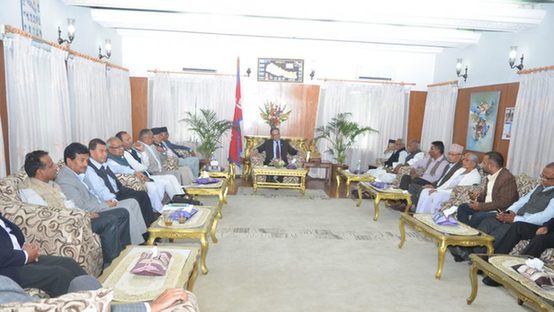Nepal heads for local election amidst political discord
- By Ritu Raj Subedi
 0 Comment(s)
0 Comment(s) Print
Print E-mail China.org.cn, April 28, 2017
E-mail China.org.cn, April 28, 2017
|
|
|
Prime Minister Pushpa Kamal Dahal Prachanda presiding over a meeting between the ruling and Madhesi parties. It struck a deal with the Madhesi parties. [Photo courtesy of PM personal secretariat] |
The ruling coalition agreed to endorse the revised constitution amendment bill on the fast track in the parliament to rope the recalcitrant Madhesi forces into participating in the election.
The latest political development followed the unification of six Madhesi parties, whose futile and prolonged agitations starting from the promulgation of new constitution in 2015 came unstuck. Even after inking the accord, some top Madhesi leaders have made contradictory remarks and ramped up anti-government rhetoric visibly for public consumption.
However, the decision to hold the election in two phases, first in the hill and then in the Terai region, is likely to create psychological division among the populace. The ruling Nepali Congress and Communist Party of Nepal (Maoist Centre) consented to do so allegedly on the advice of India.
The Communist Party of Nepal (Unified Marxist-Leninist) claims that the decision smacked of ploy to thwart the election. The party's Standing Committee meeting decided to put all efforts to foil the amendment proposal in the House, citing that it is regressive.
The opposition blew a fuse over the government plan to unveil fiscal budget on May 29, two weeks before the second round of election. "The budget seeks to influence the voters. Thus, it should be presented only after election," says UML Secretary Yogesh Bhattarai.
To all appearances, the Madhes-based parties kowtowed to public pressure but in fact they have just changed tack.
Working as an overt geopolitical instrument of India, the Madhesh-based parties have promoted dangerous ethnocentric politics to create ethnic and social cleavage in Nepal that had never previously witnessed ethnic conflict in its history.
In the beginning, they demanded only one province in the southern flatland, known as Terai/Madhesh, bordering India, but then made a strong pitch for a large number of ethnic-based provinces in the hilly and mountainous region adjoining China. This was intended to create instability across the districts contiguous with China's Tibet Autonomous Region, hoping it would spill over the border.
Behind the demand for a single province in Terai/Madhesh lies a hidden motive to weaken Kathmandu and shift the focus of national politics to Terai. With their effort to create a single Madhesh province having failed, they are now pressing ahead for two provinces in the Terai belt excluding the hilly region. This move seeks to establish the notions of two nations – Terai and Hills – and prepare the ground for the eventual secession of the plains.
After toppling the nationalist Oli government, the ruling NC and MC first registered an amendment bill in parliament last November to address the issues related to provincial boundaries, languages, citizenship and representation in the National Assembly.
It sought to split Terai from the hills, creating massive protests in the region. The main opposition, CPN-UML, called it treasonous. The bill tried to recognize Hindi as the national language and allowed naturalized citizens to hold top government posts.
As the bill was sure to be rejected in the House, the government replaced it with one based on consultation with the agitating Madhesi forces. The fresh amendment proposal does not include the provision to change the boundary of province, but it has retained other contents as it is to woo the Madhesi parties.
The new charter authorizes the local units to decide on all issues except matters relating to security and foreign relations. They can form their own police force, run cooperatives and FM radio stations, collect taxes, manage local services, formulate and execute development plans and projects, conduct basic health programs, distribute land ownership certificates and mediate among village assemblies, district assemblies and the local court. The statute grants voting rights to the heads and deputy heads of local units to elect the president and vice president, and the National Assembly, but the Madhes-based parties are hell-bent on depriving the local elected representatives of their voting rights and other crucial powers.
Democracy deepens only if the locally-elected representatives are allowed to exercise autonomy and select the highest public office holders. This will give ordinary people a strong voice in the upper echelons of government. Denying this democratic truth, the Madhesi parties have shown strong aversion to grassroots democracy. This is quite puzzling, and exposes their hidden motive to establish their lordship in the Terai region.
Ritu Raj Subedi is an associate editor of The Rising Nepal.
Opinion articles reflect the views of their authors, not necessarily those of China.org.cn.







Go to Forum >>0 Comment(s)